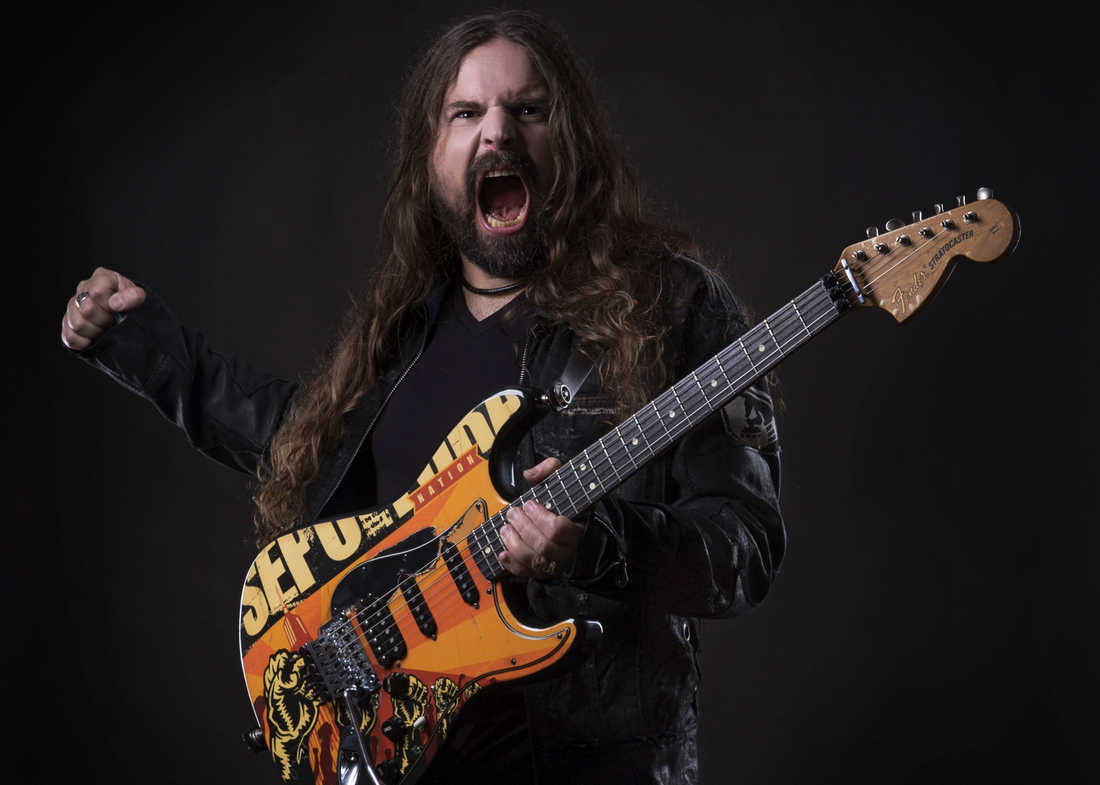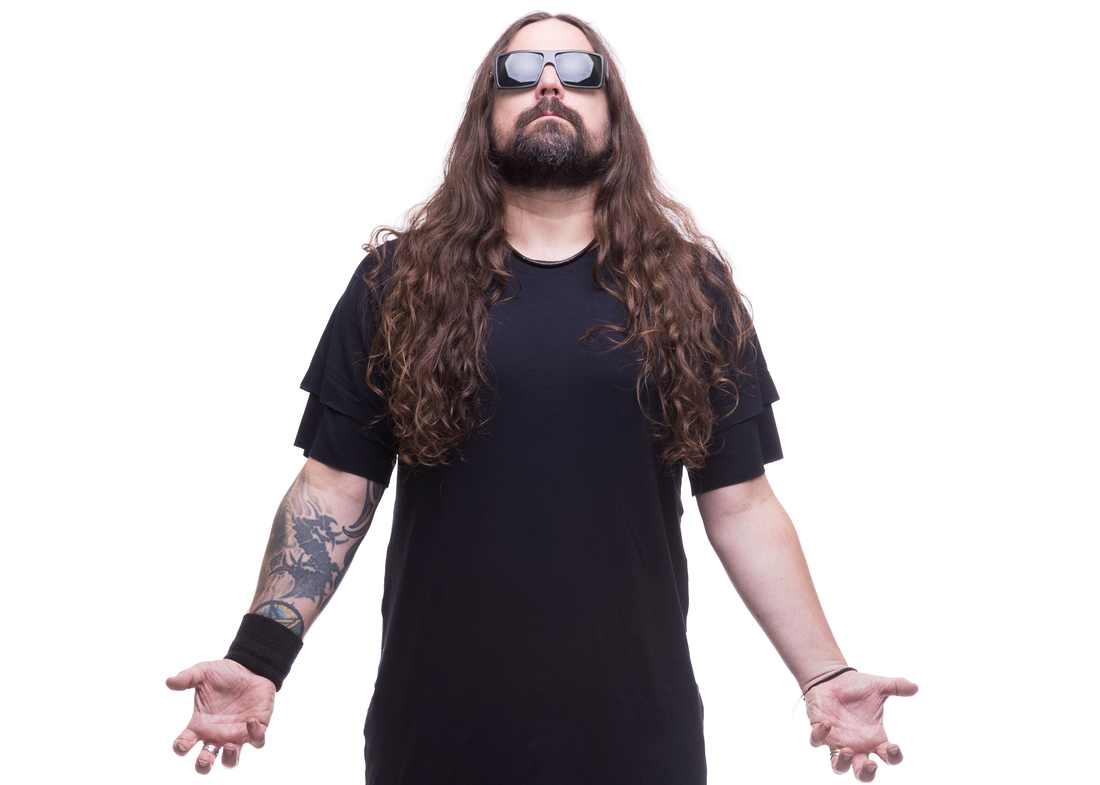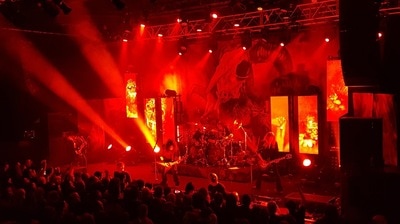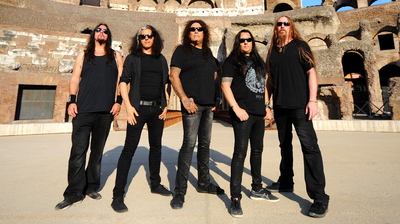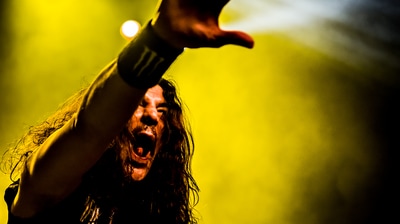|
Sepultura have been sharing their Morbid Visions since 1986. Splitting with founder member Max Cavalera a decade later, following their career defining ‘Chaos A.D.’ and ‘Roots’ albums, they regrouped with Texan Derrick Green in 1998 to release the ferociously defiant ‘Against’. Almost twenty years later, the four-piece have just released ‘Machine Messiah’, their eight disc with Green. We caught up with guitarist Andreas Kisser, for an EXCLUSIVE chat about their career, collaborating, and their tenacity. The mediator; Eamon O’Neill.
Hi Andreas, you’re back in Dublin today; do you enjoy playing in the city?
Yeah, it’s great. We love to play here - we’ve always had great shows. There are a lot of Brazilians around as well. It’s a good way to start this new chapter in our career, with the ‘Machine Messiah’ album. It’s the first part of this long tour we have ahead of us, and it’s great to be back. The tour has been amazing all over the place. Most of the places sold out, and we’re playing a lot of new stuff, which is great, and people are really relating to the new album very well. It’s very positive. ‘Machine Messiah’. It’s incredibly your eighth album with Derrick Green fronting the band. Yeah, still here! I think of the whole catalogue, we feel we’re in one of our best moments. Of course, during ‘Chaos A.D.’ [1993] and ‘Roots’ [1996] we sold a lot of albums, and we played big places and stuff, but our situation backstage was a mess; we didn’t have a relationship, and management was totally confusing, so we couldn’t really enjoy that much what we were doing. Eventually, of course, Max left the band and we had to change everything; management, labels, and we learned a lot throughout the process. So I think we are in a much better place now, in our whole career, and I think it reflects on the album; we have a great label, we have a fantastic formation with this line-up, and we have an amazing following and fans. We celebrated thirty years of career, which gave a great motivation for us. I think it’s one of our best works; I mean, we say that very new album, but it feels like that, and the response we’re getting, it’s overwhelming. Derrick was seen as quite an unusual choice to replace Max, but clearly after all this time, you chose the right man. I hope so! No, we definitely did, because Derrick was the one who was showing the future for the band. We were not interested to find somebody who could copy Max or look like him, or try to emulate his voice. We wanted to run away from that, because to try to find a clone would be stupid. So we heard a lot of new singers – even singers like Chuck Billy from Testament who tried out – but we wanted somebody new that the business didn’t know at that point. Derrick was a suggestion from somebody that worked at [record label] Roadrunner – a mutual friend that we had Mike Gitter. When he sent his tape, we felt that he could sing very harsh and tough – guttural, very heavy, but he also had a lot of new possibilities, like a great voice, a great melody. He was also a guy that could really interact with us, because it’s not only technical, you know? We have to live together; we travel so much, it’s like our second family, so it had to be somebody that really could get along. And we’re still here, enjoying ourselves and he grew up so much, and he made this band be here today. Is it frustrating to come up time and time again with the question of the Cavalera reunion, given all you’ve achieved with Derrick? We get used to that. People have certain types of expectations and ideas, and most of the people who want to see it obviously never seen Sepultura with that line-up. I mean, it doesn’t bother us; it’s just a part of what we are. That’s something that we’re not working on, for sure. We’re so busy here working with the new album, doing what we do, and this is something that is not a part of our plans, in any respect. But I mean, we just address the subject and that’s it. I know a lot of people have a curiosity about what’s going on and stuff, but there’s nothing going on – it’s very focused here on what we’re doing, and enjoying everything. You mentioned the band’s your 30th Anniversary. What do you remember about your first trips over to Ireland and the UK?
I think we came on ‘Arise’ [in 1991], because on ‘Beneath The Remains’ [1989] we only payed London, at the Marquee Club, with Sodom. And then we came after with ‘Arise’, and then I think that ‘Chaos A.D.’ was the first time in Ireland. What were those early shows like for you, because I’ve read that you barely spoke any English when you first came over? Yeah, but we were living our dream! It was fantastic to play at the Marquee Club, for instance, and places like The Ritz in New York, and Hammersmith Odeon, unbelievable that we had those opportunities. No computers, no mobile phones - once a week we talked to our family on the public phone! We grew up so much. We learned how to deal with the language barrier, and learned how to eat different stuff, and life on the road. It was great. There are a lot of great memories. It was a fantastic way of spending your youth. Moving forward, the band reached its commercial peak in 1996 with the release of ‘Roots’; what was it like achieving that success, was there a lot of pressure? Well, like I said, our backstage, our management was like a mess, confusion. We couldn’t really work the way it was supposed to, to get to that level that we wanted to be. But, the pressure is always something very positive; because the pressure gave us motivation, and we always had something to prove to someone. There’s always something that people like judging; “This is right, this is wrong, What is Sepultura? Should I change my name?!” *Laughing* People are crazy. It’s their problem, actually; we’re not here to feed or fulfil anyone’s expectations, besides ours, which is hard enough. But yeah, I mean, when we lost Max we lost the management, we lost the trust from the label, we lost the producers from the album - we lost everything, and that was the moment that it was really difficult, because we had to rebuild everything. But we’re very thankful for everything that happened. Without that, we wouldn’t be here today. I think even if Max would have continued in ’97 in the band, it could be worse. Who knows? I mean, [we might have] killed each other! You briefly stepped away from Sepultura when became Anthrax’s guitar player, filling in for Scott Ian in 2011. I was there for two weeks. It was wonderful, man. Of course, you always dream you want to play with your idols, but I was so happy to receive the call. Scott Ian called me like six months in advance, because he knew his wife was due to give birth in July, and they had these big shows with the Big Four [Metallica, Slayer, Megadeth and Anthrax]. I was so proud that they called down to Brazil; “Hey, you wanna play?!” But you know, I’m very good friends with them, Scott Ian especially. He always comes to Sepultura shows, and he jammed with us before. He’s a great guy, and one of the main influences on my playing and my sound as well, alongside James Hetfield, Kirk Hammett and Slayer, Megadeth, all of them. I wouldn’t say that that influence is particularly obvious; you clearly have your own style. Yeah, I mean, that’s what I want to achieve; to have my own signature sound. But I remember going to record ‘Schizophrenia’ – my first album with Sepultura back in ’87, and we were in the studio in Brazil with an engineer that didn’t understand about metal, and we had a pile of records for reference; and I had S.O.D., and [Anthrax’s] ‘Spreading The Disease’, because I always loved the guitar sound. So that must have made it even more surreal to have got to play with Anthrax. Yeah, it was great to be a part of Anthrax, and I prepared for it. Like I said, I had time to do that, especially the backing vocals that he does a lot, and I felt at home. They really made me feel at home, and it was so enjoyable. It was one of the best experiences of my life. Moving on, and Steve Vai joined Sepultura on stage in Las Vegas a couple of years ago. How did that come about?
Well, we’ve known Steve Vai for a long time. I’ve followed Steve Vai for many years – his solo stuff, and stuff he did with David Lee Roth and Whitsnake and Alcatrazz and Frank Zappa all that. I love his style, and I really love his playing. Before we signed with Nuclear Blast, before ‘Kairos’ [in 2011], we talked to Steve about being on his label, and it was a possibility for Sepultura to release the next album through his label in the States. So we talked a lot, we exchanged some information, and we got a communication rolling. This Rock In Rio Sunset Stage, they do it specifically to create those special, unique shows. Like we did Sepultura with Les Tambours Du Bronx, that percussive group from France which we did a DVD with - that started at Rock In Rio Sunset Stage. We did another one with this Brazilian pop musician Zé Ramalho, which was insane, and you know, every one of them really worked well. So Rock In Rio went to Las Vegas, and we got offered this opportunity and talked to Steve and he loved the idea. Sepultura and Steve Vai is an unusual mix that you wouldn’t picture working together, but it did. That’s why it worked; because we are very different. We did an instrumental song ‘Kiowas’ and we did ‘Roots Bloody Roots’, and I did this edit where I put together [Steve Vai song] ‘Bad Horsie’, and it as great. He felt so excited to do something like that, which was very different for him. He knows Sepultura; he was talking about the albums. It was such a privilege to have him together with us, it was amazing. You’ve worked with a few guest musicians over the years, including Mike Patton.
Mike Patton’s a good old friend of ours for many years. He came down to Brazil quite often, and we saw Faith No More back in 1990 in Holland. Me and Max we went to a show on a day off, and we met everybody. It was so cool, and Faith No More was always like a big influence for us. An influence doesn’t necessarily have to be obvious. The way they portrayed art and music, they’re very, almost like in a punk way, but very much amazing musicians. Mike Patton is one of the geniuses out there, the way he uses his voice. Jonathan Davis also appeared on ‘Roots’. On ‘Roots’ the guys from Korn were hanging out – Fieldy and Jonathan, because of [producer] Ross Robinson that worked together with them. It was jamming, and just ideas. We call friends and stuff like that happens. Not really too much plan, you know? Would you say that Sepultura’s audience accept it when you go off-road like that? Generally, the majority of the people, yes, because they follow and grow up with the band. But of course when we do something different, we lose and gain fans. People that never listened to Sepultura start listening to Sepultura, and other ones, you know; “fuck that band”, or whatever. I respect them all. It’s impossible really to please everyone, and I don’t want to do that because it’s something that doesn’t exist. We explore different things to grow as musicians; to work with people, to work with different rhythms, and try to create aggressive music in different ways. We come from Brazil, and we have this special Brazilian way of doing things, for good or bad. But if we listen to everyone, we’re going to get fucked, because we’re not going to move under that kind of a pressure. Sepultura have continually looked for new sounds. I think art has this mission, to show new possibilities. If you don’t go on the risk territory, you’re going to be copying yourself or somebody else. Imagine a world without Picasso or Stravinsky. You open your mind and you see new possibilities. It always comes from the arts scene; Salvador Dalí for instance, showing the melting clock - it makes you trigger something that you think and you use your brain, not only receiving information and acting according to that, but using your human abilities. And on ‘Machine Messiah’ we talk about that; not to be enslaved by robots, but to have and to keep this human ability of contest, like argument or saying ‘no’ and asking ‘why’. Nowadays, people are more aware of things, which is very human, and we have to keep that ability to have that. So on ‘Machine Messiah’ we touch that subject. Finally, what’s next for Sepultura? We’re just finishing this tour with Kreator, we go back to Brazil, we have a few shows in Brazil, and then we go to North America with Testament and Prong for another five weeks. We have another show in São Paulo in May, and then we come back to Europe for June and July for festivals. We have Rock In Rio in September in Brazil, which is going to be great – the first big show in Brazil for the new album. Have you any more shows planed for the UK and Ireland? Yes, I hope so, definitely. We’re trying to come back at the end of the year with our own tour. We’re playing as much as we can. Like this interview? Like us on Facebook and follow us on Twitter for regular updates & more of the same! |
|
Sepultura
"Art has this mission, to show new possibilities. If you don’t go on the risk territory, you’re going to be copying yourself or somebody else." - Andreas Kisser.
© 2016 - 2024 eonmusic.co.ukContact: [email protected]
|

